- Home
- John Everson
Vigilantes of Love Page 3
Vigilantes of Love Read online
Page 3
In the back of the store was a small video rental section. Classic kitsch and cult fare – A Clockwork Orange, Peter Seller’s Pink Panther movies, a good selection of Russ Meyer’s films (including Faster Pussycat, Kill, Kill, as I recall), Hammer horror films and even, I think, I Spit On Your Grave. Behind that was a stairway leading up. I asked Lissa where it went to one day, and she shrugged.
“I think they keep extra stock and stuff there.”
“You’ve never been there?”
She looked puzzled for a second, then said, “Nope,” and smiled. “Not allowed.”
“Not allowed?”
She shrugged again and breezed away, leaving me craning to see up the blue-grey painted steps to the dark brown wooden door at the top. The black cat slid between my legs and leapt to the third step, then turned to stare at me, green eyes flaring.
I let it go. I wish that had been the last I’d thought of it. But my mind does grab onto things and chew and chew.
Another day, as I dashed past the stairway scrawl proclaiming The Slits as the best babes ever, Lissa was alone at the counter, and I went right to her.
“Hey,” I said. “Heard anything good lately?”
She was wearing a deep blue summer dress, tie-dyed with waves of purple and blue. It made her look pale, but beautiful. Her hair hung in lazy black twists over her shoulders, and her eyes seemed especially dark. I wondered if she’d been out drinking at Mabel’s the night before.
“No,” she said, covering a yawn with her hand.
“Catch a show last night?”
She shook her head, again.
We talked about something, just B.S., and behind me a couple of punkers came in, hair bright pink and alert like the crest of a cockatoo. The Master started towards the front of the store and Lissa whispered.
“C’mon, he’s in a bad mood today.”
We walked to the back of the store and he scowled at me as I went past. This was a guy you didn’t want to piss off. His soft spoken descriptions of the barrage of guitar distortion that he played on his radio show were a stark contrast to the waist length black hair and steel blue eyes that seemed to pop out of his skull when he looked right at you. He was probably a nice guy, but he looked like he could rip your arm off and then laugh about it. I avoided him when I could.
Back by the cult videos, I nodded toward the stairs.
“The Master’s busy, wanna see what’s up there?”
I swear she trembled at the suggestion.
“No, I couldn’t,” she said. She clutched the doorjamb as she peered up the stairs, but then pulled herself back as if from vertigo.
“Aren’t you curious what’s up there?” I asked. Call me the devil.
“Yeah,” she admitted slowly. “But if he catches me up there…today would be a bad day to try.”
I let it go. “You busy tonight?”
“Yeah.”
Strike two.
I think it was Lissa who convinced me to buy the first This Mortal Coil record, It’ll End In Tears, because I can’t play it even now without thinking of her. Not long after, I bought their second, the double album Filigree & Shadow, too. Back in college, I used to turn all the lights off and lie on the floor listening to the reverb-drenched tape loops and haunting voices, as if it was the music of angels. It sure sounded like it.
“You can just feel the other side,” she told me. She was right.
“You can always trust an artist if they have soul,” she said once.
“You mean, like, Aretha Franklin?” I asked, leery. I never liked Aretha.
“No, I mean…” she pointed at a grotesque album cover with a picture of a shrivelled, aborted baby’s hand enclosed in an adult’s palm. The Dead Kennedys. “Like there,” she said. “They aren’t afraid to put it out there. The music might be loud and abrasive, but you know they’re going to go all the way. Someone who has an album cover like that is going to push to the corners of their soul for their music. Or take Cocteau Twins. You look at their albums and you know that they believe in beauty and mystery and art, and they’re going to do their best to deliver it to you. They’ve got soul.”
“So anybody who puts out an interesting album cover has soul?” I said, deliberately misinterpreting her.
She shot me a black eye.
“Noooo,” she drawled. “But think of it. These bands that just pose in their tight leather pants on the cover, or even worse, hire some half naked girl to pose on their album. What does that tell you about their music? What does it say about what they think of their music? Someone who believes in their album enough to make sure the cover is beautiful or striking in some important way that relates to the music – they have soul. You can trust them to deliver something special to you.”
We talked a lot about aesthetics, Lissa and I. She loved concert posters as much as album covers. You would have thought she was an art major. But she was English Lit.
“So you’ve got to read all that poetry crap?” I asked her once.
“Why is poetry crap but Kate Bush’s lyrics are brilliant?” she countered. “Kate writes poetry. You love poetry, as long as there’s a voice and a drum behind it.”
I couldn’t argue, so I shut up. The black cat leapt up onto the counter between us. She stroked its back and the cat arched its neck at her, turning to make sure she caressed every inch of its spine.
“Psychedelic Furs are playing Huff’s Gym on Sunday,” I began, but she cut me down instantly. “Poetry test on Monday,” she said, and winked.
Three strikes, you’re out.
I followed her to the back of the store.
The Master was off in a corner, animately discussing the merits of Throwing Muses’ debut album with a pimply looking kid in a Smiths T-shirt. Meat is Murder, it proclaimed. “Yeah,” I thought, “so is dating.”
“Haven’t you ever wondered what they hide up there?” I asked, back on the same obsession. I don’t know what I thought was there, but I had to know. And Lissa seemed like the best way to find out. They could call the police on me, or worse, bar me from the store. But she was an employee! What would they do if they caught her, other than say, “Stay out?”
She hesitated. “I don’t know.”
“The Master’s busy, he won’t even notice,” I urged. “Just take a peek.”
She stepped on the first stair, and the black cat streaked ahead of her, as if to guard the way. She laughed. “See, Blackie knows I’m not supposed to go up there.”
She reached down and stroked the cat’s head, but it hissed at her and she drew back.
“Just go quick,” I said. “He’ll never know the difference. Come on, I dare ya.”
She looked afraid, but then took a deep breath and hurriedly pushed herself up the stairs.
I looked back and forth from her to The Master as she climbed the steps, making sure that he didn’t notice her ascent. But he didn’t even glance in our direction.
I watched her from the bottom of the stairs. She was in faded jeans, a dark T-shirt and a flannel today. She was gorgeous. Delicate, but not a priss. Smart, but not a know-it-all. I had to get her to go out with me somehow.
She put her hand on the doorknob and it creaked open, throwing a slice of midday sunlight onto the dark stairwell walls.
She disappeared inside the room at the top of the stairs.
She screamed.
The black cat tore past me like a bullet down the stairs and leapt onto one of the record bins. I forgot about keeping our exploration a secret. I yelled her name as I vaulted up the stairs. “Lissa?!”
It was freezing in the upper room; a window was open facing the alleyway and the faded brown drapes shifted in the March wind. There was an old wooden schoolteacher’s desk in the right corner of the room and a black steel file cabinet nearby. Stacks of old LPs spilled from the room’s corners.
At first I thought she’d jumped out the window, but it was only open a few inches. She couldn’t have opened it, jumped and pulled it down behind he
r as she fell. Still, I ran to the window and looked out to see a telephone pole and empty asphalt below, a red and white Chevy Citation parked at the doorway of the red brick apartment one building over.
It was only when I turned around that I saw the blood.
Crimson and thick. Spreading.
It seemed to flow from the cracks in the floor, quickly growing from a buckets-worth to a pool.
The floor was bleeding and Lissa was gone.
“Lissa?” I called, a note of hysteria in my voice.
“Lissa?” I whispered.
The pool of blood spread out across the room, dampening the stacks of albums and staining the legs of the desk. I shivered as the late winter breeze blew in like a gale from the cracked window.
I didn’t know where to turn.
“What the hell are you doing up here?”
The Master stood in the doorway, six feet of black-T-shirted, black-haired, glaring-eyed anger.
I shrunk back to the window, pointed at the floor, and babbled.
“Lissa came up here, it was my fault, I asked her to. But then she screamed and I came up and she wasn’t here and there’s so much blood…” which, even as I said it, I saw was untrue. The floor was only dirty brown wood. The same scuffed, turn-of-the-century narrow, dark hardwood that seemed to floor most of the buildings around the university.
The Master didn’t move, only regarded me with those piercing eyes.
“Lissa hasn’t been up here in a year,” he said softly. “Lissa hasn’t been anywhere in a year. I don’t know what your deal is, kid, but I’m sick of you coming around here acting weird and talking to yourself. I think you need to get out of here. Now.”
I stepped wide over the place where I’d seen the blood and left the store.
I never saw Lissa again.
But sometimes I hear her. In the guttural screams of The Dreaming, behind the tortured bells and echoes of Filigree and Shadows. It took several visits to the store for me to believe that she was gone. I tried to go when The Master was busy and ask some of the other guys working the store where she was, but they’d look puzzled or stare at me like I was crazy. “Don’t know who you mean, man. No Lissa has worked here this semester,” they’d say and go back to alphabetizing.
It took months until I finally learned the whole story, accidentally, during a Martial Arts class in the Phys. Ed building. The professor told it as a warning to us. Used her as a reason for us to get A’s in his class. Told us of a student from the year before named Lissa. Of how she’d been putting away the day’s cash in the safe one night when some asshole snuck up behind her and stabbed her in the back with a switchblade, took her money and left her to die on the bare wood floor of the upper room of the Record Stop on Main Street.
I don’t know what he thought when I clenched my stomach and ran from the class.
Sometimes I feel guilty that I made her face the scene once more. As if I killed her again.
What did she see when she entered the room of her death? Did the memory of her murder come flooding back to her like a shot? What did she think of me for sending her there?
I can still see her face some nights in the darkness when I can’t sleep. I picture those taut pink lips talking of soul and honesty and expression. I see her eyes like pools of endless truth and life. Sometimes I cry, knowing the girl that I missed.
And sometimes I whisper to her. I hope she can hear. Or maybe it’s better if she can’t.
I want so badly to hold her tight to me, but I hope, more than anything, that my foolish curiosity set her free.
“But every night I lie in bed and I think of your face
Remembering a better time in a gentler place
All I know is that this is the hardest thing I’ve done
and loneliness, the bitter prize I’ve won.”
–Industrial Disease, “Does It Have To End”
~*~
A TIME FOR MUSIC
“No, it won’t feel normal again. It’s all your fault anyway,” Mark screamed. “You drove him away and now we’ll never be a family again. I hate you!” Mark’s face flared red with anger. His mother’s face grew pinched and turned ghostly white. Tears glistened in both their eyes as her hand rose to slap his mouth.
Their eyes connected for one electric second and her reaction slowed.
With a mix of guilt, satisfaction and gut-bleeding emptiness, Mark turned and ran out of the kitchen and up the back stairs.
“And I hate this place!” he yelled over his shoulder, stomping heavily up the hardwood stairs.
His grandparents’ house was a musty, decaying mansion tucked inconveniently away from town on a wooded hill. Mark and his mother, Marilyn Baer-Ackert – soon to be just Baer again – had moved in with them while the divorce was finalized. That meant Mark had to leave all of his friends, change schools and worst of all, live just far enough away from his new town and school that he could never go out and try to make new friends. He was a prisoner in a dying house with old, dying people. Mark felt as if he was dying himself.
He and his mother argued constantly these days. Most of the time it felt like he’d lost both of his parents.
And his grandparents weren’t any help. They always sided with her, patted his shoulder and said, “She’s under a lot of pressure right now, Mark, try to understand.”
What about him? Did anybody ask him about the pressure he was under? No.
Did anyone ask him if he want to ride an hour every day on a bus to go to a strange school with kids who all knew each other and looked at him like some kind of alien? No.
Did anyone ask if he wanted to listen to his parents rip on each other non-stop and look to him for agreement? No.
He knew a thing or two about pressure too, but Grandma and Grandpa didn’t think about that.
The grey rain beat on the window for over a half hour while Mark lay on his bed, cooling down. The pillow was damp and the room dark when he finally sat up. Apparently Mom wasn’t going to chase up here after him this time. Good. He was sick of, “Please, Mark, just cooperate with me,” and “Things will settle down and get better, I promise.” Things weren’t getting better and they couldn’t get a whole lot worse, he thought bitterly, trying to swallow the heavy lump in his throat. Everything in his life was wrong.
Mark paced the room, looking again at the old stickers his aunts had left marring the pine paneling of the walls. “ Jellystone Park ” and “Walt Disney World” and mini-maps of states like Arizona to California. The grandparents had taken their kids on plenty of vacations once; he’d never been anywhere.
Mark slammed his fist against a faded Jellystone Yogi sticker. It resounded with a hollow echo. The eaves were behind this wall, he realized, and looked for the entry. He’d gone into the narrow attic corridor once before, from his mother’s room down the hall. The dusty space was filled with trunks and curling pictures and boxes of forgotten odds and ends that had stacked high in the century his ancestors had owned this house.
There, behind the bed. The paneling looked whole to the casual glance, but a close examination revealed the grooves of a long unused door.
Mark slid the bed away from the wall and found the tiny latch, heretofore hidden by the headboard. He pulled it, and the warm draft of stale air and dryrotted wood puffed into the room. He inhaled deeply, savoring the musty smell. The scent of treasure!
A half dozen open boxes of mouse poison were scattered inside the door, their contents slopped over onto the plywood. A sprung trap lay to the right. No still furry bodies, though. He stepped over the extermination devices, and felt along the wall for a light. A bulb hung near the door in his mother’s room, so there should be one here as well. His hand grew sticky with spiderwebs, which he violently flung away. Then he found and pulled the string for the light. The bare bulb flicked to life, casting a sallow yellow glow across a burial ground of memories. Closing the door behind him, Mark sat in the middle of the narrow open space and looked around.
On
e side of the attic ceiling slanted sharply to the floor just a couple feet away on one side, while boxes and lamps and other odd items were stacked against the bedroom wall.
Eager to explore, he began pulling down boxes, and digging through their contents. Here was one with old dishes, chipped and covered with fine yellow fractures, but packed away nonetheless. Not like the grandparents would actually throw anything away, he thought with a shake of his head. Here was a box of newspapers, cracking with age. They were important headlines, he realized, finding a banner “One Small Step…” across the top of one from 1969, which lay atop another paper with a picture of a black car and headline screaming “Nation Mourns the Death of a President.” Other, older papers showed veterans returning after wars, and one proclaimed a world series victory for the Chicago Cubs. Mark read the whole story in that paper, disregarding the flakes of yellow paper that fell like rust in his lap as he turned the pages.
In another box he found a strange collection of artifacts – ancient pictures of grim looking people, staring out of the thick paper-backed photos almost in challenge. So you think your life is so bad? Try living in 1910, he could almost hear them saying. Here was a more recent stack, with his grandparents before their hair had thinned and grayed. In the foreground lounged a girl of sixteen or seventeen, with long black hair and a twisted smirk on her face. His mother, he realized with a start. And she’d been pretty! A pang of unease tweaked his insides and he dropped the picture. But not before he wondered how that mischievous looking girl had changed from vibrant black and white to dreary color now?
He rifled through the box some more, finding radio tubes, a pink quartz rock, a pipe, and a cigar box. He pulled from the larger box and fingered the ornate lettering across the lid. “Dunham’s Finest,” it read. Would it still have cigars inside? He could take them down to the pond and try them out.
The lid opened with a paper squeal to reveal another assortment of valueless odds and ends. Hairbrush, fountain pen, belt buckle, more pictures, shaving razor, a silver Jesus medallion, a flute… A flute? Now that was cool…

 The Devil's Equinox
The Devil's Equinox The Pumpkin Man
The Pumpkin Man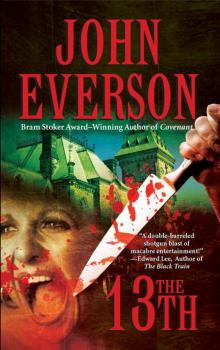 The 13th
The 13th Vigilantes of Love
Vigilantes of Love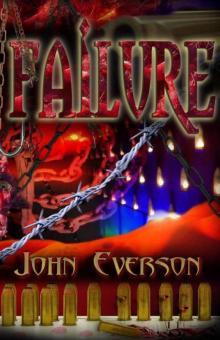 Failure
Failure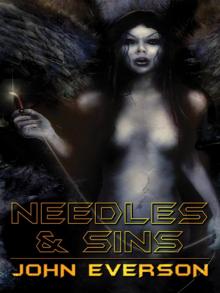 Needles & Sins
Needles & Sins Sacrificing Virgins
Sacrificing Virgins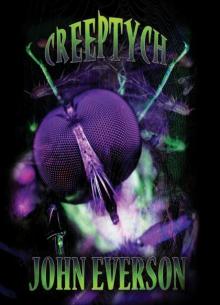 Creeptych
Creeptych Siren
Siren Redemption (Covenant Book 3)
Redemption (Covenant Book 3)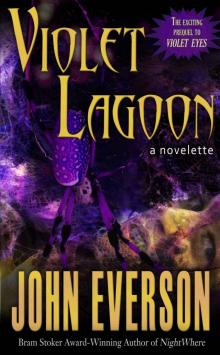 Violet Lagoon
Violet Lagoon Covenant
Covenant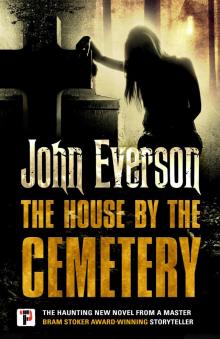 The House by the Cemetery
The House by the Cemetery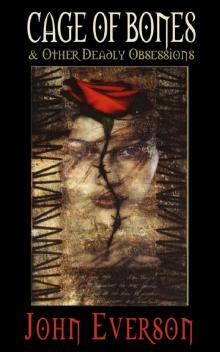 Cage of Bones & Other Deadly Obsessions
Cage of Bones & Other Deadly Obsessions Deadly Nightlusts
Deadly Nightlusts NightWhere
NightWhere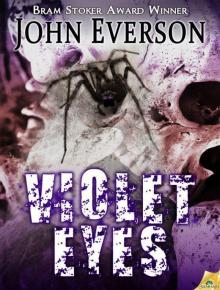 Violet Eyes
Violet Eyes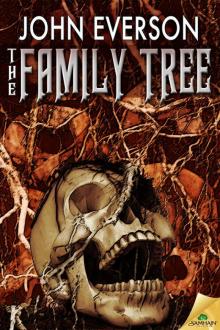 The Family Tree
The Family Tree